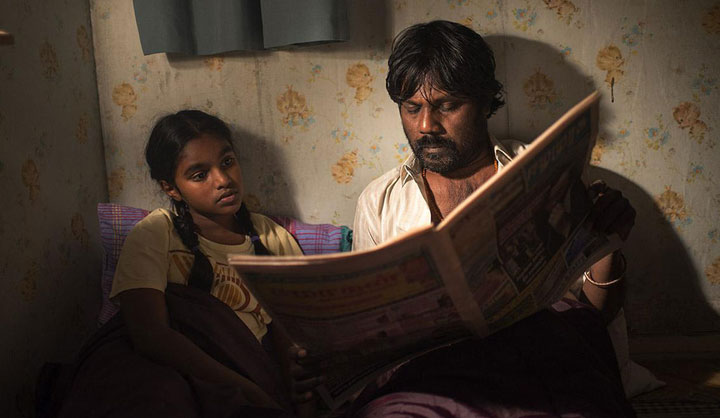CANNES, France – The Cannes Film Festival is a grand hierarchy with strictly defined elevations of movies and media access, where films are met by high praise or lowly boos. And so there was a strange fittingness that the scandal of the 68th Cannes Film Festival, where all status is measured, came down to the importance of a few inches.

Woman’s footwear, of all things, was thrust to the forefront of Cannes after several women were turned away from a premiere because they weren’t wearing high heels but flats. It was a the kind of Cote d’Azur tempest that often overtakes Cannes, especially because the prevailing theme of this year’s festival was female equality in film — the kind of roles thrust to the centre of movies and the people directing them.
Here, Cannes was in sync with the attention the issue has recently received elsewhere. But what will stick in the mind from the festival, which closed Sunday with Jacques Audiard’s refugee tale Dheepan winning the Palme d’Or, likely won’t be the many panels about women in film, but the plethora of powerful leading performances by women, including Cate Blanchett (the sumptuous period romance Carol), Emily Blunt (the bleak drug war thriller Sicario), Marion Cotillard (a bleakly stylish Macbeth), Margherita Buy (the moving tribute My Mother), Emmanuelle Bercot (the up-and-down romance My King) and Charlize Theron (the explosive Mad Max: Fury Road).
The symbol of Cannes ’15 wasn’t a stiletto; it was the dirty, smouldering face of Theron’s road warrior Furiosa.
Though summer blockbusters usually only supply the festival a flashy red carpet distraction, George Miller’s Mad Max sequel-reboot was perhaps the most lauded film in Cannes, rivaled only by a far more serious sensation: Son of Saul, a tracking close-up of a Sonderkommando at Auschwitz who believes he’s spotted his son in the camp’s gas chamber.
But what is a hit on the Croisette is sometimes a blip back home. As the glow of Cannes fades, here are the films from the festival that may sustain the buzz they earned on the Riviera:

Get daily National news
WHAT YOU’LL HEAR ABOUT COME OSCAR SEASON:
Premiering just days before Ireland legalized gay marriage, Todd Haynes’ Carol is grippingly contemporary despite the lushness of its period drama. Based on the 1952 Patricia Highsmith novel The Price of Salt, the film stars Blanchett and Rooney Mara as two women — one married with a child, the other a mousy shop girl — who are intractably drawn together, but who must cloak their budding romance in disguised gestures and subtle glances. Mara shared in the best actress award at Cannes, but Harvey Weinstein, who is distributing, will ensure that’s not the last honour for Carol. Also look for the tender Pixar tale Inside Out, Cotillard’s empathetic Lady Macbeth and the veteran stars of Paolo Sorrentino’s Youth (Michael Caine and Harvey Keitel) to find some award season attention.
THE PALME WINNER THAT PITTED CRITICS VS. COENS
Moviegoers who see Audiard’s Dheepan will have a choice between siding with Cannes critics or the Coen brothers. Though many Cannes scribes didn’t embrace the French filmmaker’s latest as warmly as his previous efforts, the jury led by Joel and Ethan Coen surprisingly picked Dheepan for the Palme d’Or. Outside of the festival, Dheepan may resonate better for its tale of Sri Lankan refugees posing as a family in order to gain asylum in France. Few filmmakers capture transformation like Audiard, the director of Rust and Bone and A Prophet.
THE THRILLER GENRE FANS CAN BE EXCITED FOR
Cannes isn’t known for its genre thrills. But just as the cinematic horror hit It Follows drew raves at the festival last year, The Green Room, by Jeremy Saulnier, should be marked by thriller fans. In his second film following the lean revenge film Blue Ruin, Saulnier steps confidently into a bigger production, co-starring Patrick Stewart, about a touring hardcore punk band that runs into trouble at a backwoods gig for Neo-Nazi skinheads. Denis Villeneuve’s Sicario, about an FBI agent (Blunt) roped into a covert task force sent into Mexico, will also excite many for its sure-handed muscularity.
WHAT WILL HAVE ART HOUSES SWOONING
Hou Hsiao-hsien’s The Assassin, a martial arts drama, may seem like stuff of genre, too. But the Taiwanese filmmaker’s latest, which won best director, bares little with the fast-paced action usually found in the genre. It was, undoubtedly, the most gorgeous film at Cannes; nearly every image is breathtakingly composed. Some, however, thought it lacked in substance behind the splendid imagery.
HARDEST FILM TO WATCH BUT YOU SHOULD:
A harrowing Holocaust drama set among the Jewish workers of a concentration camp is precisely the kind of film many feel obligated to see, rather than enthusiastic to watch. But Son of Soul, the first feature by Hungarian director Laszlo Nemes, is something wholly unique: a visceral, bone-chilling, first-person plunge into darkness.
THE ODDITIES WORTH YOUR CURIOSITY
The Lobster and Tale of Tales — two films bound by a wry surrealism and John C. Reilly — vied for most bizarre of the Cannes competition. In Yorgos Lanthimos’s The Lobster, middle-aged, unmarried singles (Colin Farrell, Rachel Weisz, Reilly) gather at a remote Irish hotel where, if they don’t couple up, they’re turned into an animal. Weirder still was Tale of Tales, Matteo Garrone’s adaptation of grotesque 17th century Neapolitan fairy tales.





Comments
Want to discuss? Please read our Commenting Policy first.